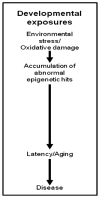The EPIIC hypothesis: intrapartum effects on the neonatal epigenome and consequent health outcomes
- PMID: 23414680
- PMCID: PMC3612361
- DOI: 10.1016/j.mehy.2013.01.017
The EPIIC hypothesis: intrapartum effects on the neonatal epigenome and consequent health outcomes
Abstract
There are many published studies about the epigenetic effects of the prenatal and infant periods on health outcomes. However, there is very little knowledge regarding the effects of the intrapartum period (labor and birth) on health and epigenetic remodeling. Although the intrapartum period is relatively short compared to the complete perinatal period, there is emerging evidence that this time frame may be a critical formative phase for the human genome. Given the debates from the National Institutes of Health and World Health Organization regarding routine childbirth procedures, it is essential to establish the state of the science concerning normal intrapartum epigenetic physiology. EPIIC (Epigenetic Impact of Childbirth) is an international, interdisciplinary research collaboration with expertise in the fields of genetics, physiology, developmental biology, epidemiology, medicine, midwifery, and nursing. We hypothesize that events during the intrapartum period - specifically the use of synthetic oxytocin, antibiotics, and cesarean section - affect the epigenetic remodeling processes and subsequent health of the mother and offspring. The rationale for this hypothesis is based on recent evidence and current best practice.
Copyright © 2013 Elsevier Ltd. All rights reserved.
Conflict of interest statement
None.
Figures
References
-
- Moshe E. Early life, the epigenome, and human health. Acta Paediatr. 2009;98:1082–4. - PubMed
-
- Oberlander TF, Weinberg J, Papsdorf M, Grunau R, Misri S, Devlin AM. Prenatal exposure to maternal depression, neonatal methylation of human glucocorticoid receptor gene (NR3C1) and infant cortisol stress responses. Epigenetics. 2008;3:97–106. - PubMed
-
- Fish EW, Shahrokh D, Bagot R, et al. Epigenetic programming of stress responses through variations in maternal care. Ann N Y Acad Sci. 2004;1036:167–80. - PubMed
MeSH terms
Grants and funding
LinkOut - more resources
Full Text Sources
Other Literature Sources
Medical


